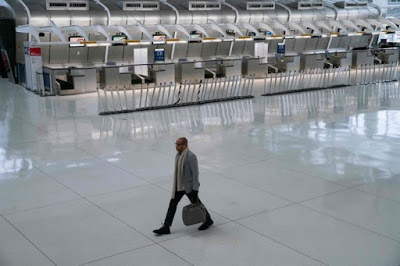What the coronavirus is telling us
 |
| Edgar Morin 12/03/2020 |
This new crisis once again reveals our interdependence. The response can only be one of solidarity and a planetary one, writes Edgar Morin in an Op-Ed
Tradotto da Fausto Giudice
It appeared far away in a unknown city in China. Immediately, compartmentalized minds, including that of our then Minister of Health, reassured us: this virus will not arrive in our country. And the virus travels from hand to hand, from breath to breath, takes the road, the boat, the plane, goes from land to land, from cough to saliva. It penetrates by stealth, here and there, in Lombardy, in the Oise, and spreads throughout Europe. The contamination wins. The epidemic alert is declared.
The primary problem is obviously health. Hospitals, victims of senseless cuts, are already overwhelmed, and the virus will amplify the hospital crisis. The cure is still unknown, the vaccine non-existent. Doctors’ statements are contradictory, some warning of great danger, others reassuring about the low mortality rate that is foreseeable.
The public authorities are taking protective measures that can only partially isolate either the sick or the healthy at risk.
Preventive measures taken all over the world are hitting schools, meetings, slowing down trade, immobilizing freight and passenger ships, limiting international travel, blocking China’s export products, especially medicines, reducing fuel consumption, triggering a crisis between oil-producing countries, causing stock market crashes, and beginning to provoke an economic crisis in an already deregulated world economy.
In fact, the virus is bringing a new planetary crisis into the planetary crisis of humanity in the era of globalization. But this complexity continues to be considered and dealt with in separate issues and sectors everywhere. Each state closes its nation in on itself; the UN does not propose a grand planetary alliance of all states. Should we pay, in additional victims, for the widespread sleepwalking and lack of spirit that separates what is connected? And yet, the virus reveals to us what was hidden in the compartmentalized minds formed in our educational systems, minds that were dominant among the techno-economic-financial elites: the complexity of our human world in the interdependence and intersolidarity of health, the economic, the social, and everything human and planetary. This interdependence manifests itself in innumerable interactions and feedbacks between the various components of societies and individuals. Thus, the economic disruption caused by the epidemic encourages its spread.
The virus then tells us that this interdependence should give rise to human solidarity in the awareness of our common destiny. The virus also reveals to us what I have called the “ecology of action”: action does not necessarily obey intention, it can be deflected, diverted from its intention and even come back as a boomerang to strike the one who triggered it. This is what Professor Eric Caumes from Pitié-Salpêtrière Hospital predicts: “In the end, it is the political reactions to this emerging virus that will lead to a global economic crisis… with an ecological benefit.” The ultimate paradox of complexity: economic evil could generate ecological betterment. At what cost? In any case, while doing us a lot of harm, the coronavirus tells us essential truths.


